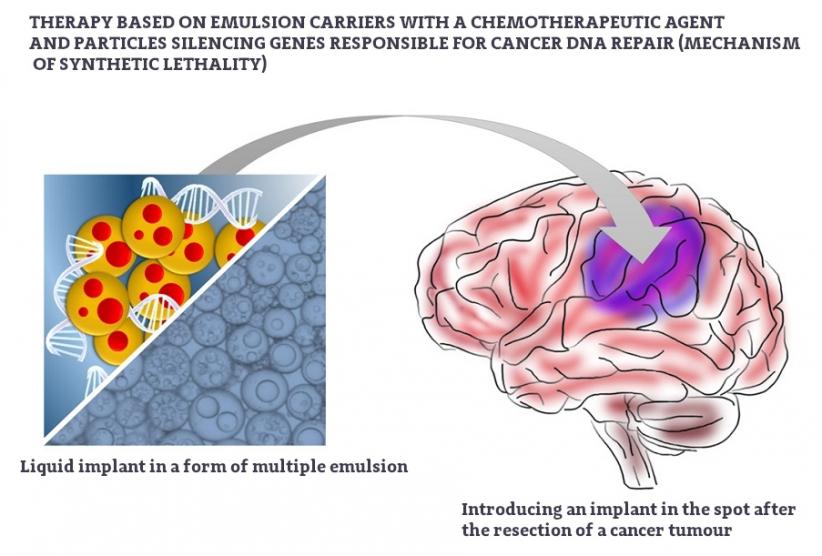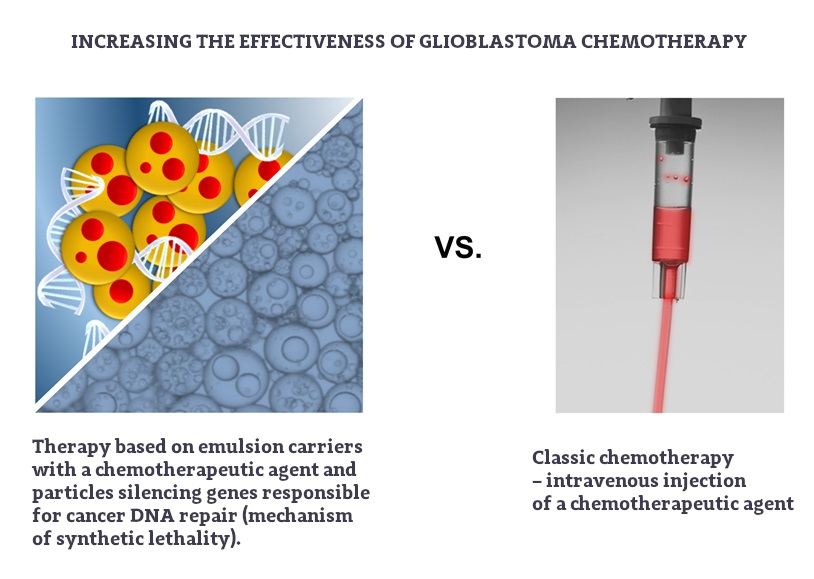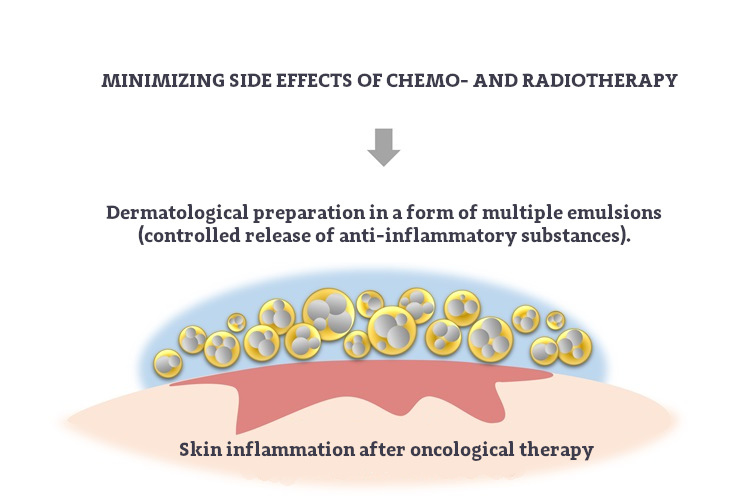New therapy for brain cancer and elimination of side effects of chemo- and radiotherapy
Glioblastoma multiforme is one of the most invasive forms of primary brain cancers, and the average lifespan of the patient from the moment of diagnosis is about 12 months. A team of researchers from the Warsaw University of Technology, Polish Academy of Sciences, and Warsaw University is working on solutions which are to increase the effectiveness of chemotherapy and improve the comfort of living of a cancer patient.
Experiments conducted by an interdisciplinary team aimed to devise a liquid drug carrier in a form of multiple emulsions (a system with a structure of “drops in drops” type suspended in a continuous phase) apart from a classic chemotherapeutic agent, containing particles silencing the genes involved in cancer growth.
The solution utilizes the mechanism of synthetic lethality (forced cell death) through blocking/silencing appropriate genes of DNA repair in cancer cells. Moreover, the team has proposed a dermatological preparation to minimize the side effects of chemo- and radiotherapy in a form of multiple emulsions for controlled release of anti-inflammatory substances soothing skin inflammation in oncological patients.
Increased effectiveness of glioblastoma chemotherapy
“Laboratory research conducted utilizing a devised emulsion carrier with therapeutic agents in the environment of glioblastoma multiforme has proved that the therapy based on the induction of synthetic lethality proposed by our team is considerably more effective than classic chemotherapy,” says Ewa Dłuska, PhD, DSc, Associate Professor form the Faculty of Chemical and Process Engineering of the Warsaw University of Technology. “The therapy is also a great chance for increasing the effectiveness of novel solutions in chemotherapy. Depending on the dose of therapeutic agents, we have achieved approximately a 20-30% decline in cancer cell vitality as compared to a therapy based on an emulsion lacking gen-silencing promoters. Eventually, the therapy will include an introduction of a liquid implant in a form of a multiple emulsion into the spot after the removal of a cancerous tumor. It is an innovative solution in contrast with the known permanent or gel implants and, as experimental research has shown, is more effective than classic chemotherapy,” she adds.
Elimination of side effects of chemotherapy
The second stage of the project, on which intensive work is underway, is devising a dermatological emulsion which would soothe the inflammation of skin and nails, among other things, provoked by chemo- and radiotherapy.
“The devised conditioner has a form of a multiple emulsion, which thanks to its structure “drops in drops in a continuous phase” facilitates placing different conditioning and moisturizing substances in individual drops,” says Professor Dłuska. “Such a structure of the preparation ensures gradual and long-term release of the substances,” she explains.
To assess the effectiveness of the emulsion, researchers first expose human skin cells to doses of radiation equivalent to radiotherapy, and then introduce the produced conditioner into them and check the biological state of the cells. The achieved results of the longevity of cells and their morphological image confirm the effectiveness of the conditioner after around 48 hours of application.
“We plan to complete our project at the end of 2022. We are planning to spend these final months on perfecting the formula of the conditioning emulsion and defining the transport parameters of ingredients from emulsion carriers of varied characteristics in terms of the structure and size of the drops and physio-chemical properties,” says Professor Dłuska.
-
The project “An emulsion delivery system for therapeutics - cancer treatment aided by a mechanism of synthetic lethality” is funded by the research grant of the Research Centre POB Biotechnology and biomedical engineering of the Excellence Initiative - Research University programme implemented at the Warsaw University of Technology.
Research team:
Ewa Dłuska, PhD, DSc, Associate Professor; Elżbieta Speina, PhD, Associate Professor; Agnieszka Markowska-Radomska, DSc; Agnieszka Siemion, DSc; Dr Konrad Kosicki




